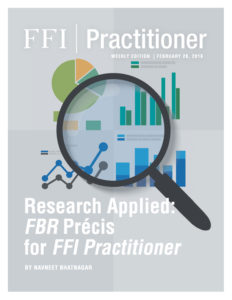
View this edition in our enhanced digital edition format with supporting visual insight and information.
Thanks to Navneet Bhatnagar of the FBR Research Applied Board for sharing this thoughtful précis of “The Intersection of Family Firms and Institutional Contexts: A Review and Agenda for Future Research” – an article that appears in the March 2018 issue of FBR. The research article and related précis seek to refine the understanding of family firms’ unique interactions with their institutional contexts.
Institutions are prescriptive systems that define acceptable behaviors in a society. They also prescribe norms for business organizations and encourage compliance through a combination of incentives and controls. Firms that abide by those norms are considered legitimate and get benefits such as access to resources and relationship networks. ‘Institutional Theory’ offers a framework to understand how institutions determine firm behaviors and vice-versa.
Family firms operate at the intersection of family and business institutions and interact with their institutional contexts in unique ways, which remain inadequately examined.
This article reviews research studies at the intersection of institutional contexts and family firms — published from 1986 to 2017 in 24 top-level journals in the fields of management, entrepreneurship, family business, economics, and sociology. Using the lens of ‘Institutional Theory’, the paper reviews 124 articles and develops refined understanding of family firms’ interactions with their institutional contexts.
Two kinds of institutions:
Institutions can be distinguished as formal institutions (such as laws, regulations, and supporting infrastructures that prescribe socially accepted behaviors) and informal institutions (such as the society’s values, beliefs, and norms that support behaviors or outcomes deemed appropriate). Formal institutions are tangible and can enforce their prescriptions using authoritative power (e.g., regulations). Informal institutions are intangible and gain influence through localized societal acceptance (e.g., family values).
The authors categorized research based on whether a study examined the influence of institutions on the family business or the impact of family business on institutions. This classification sorted family business research in institutional context, into four categories. These were the studies on the:
- influence of formal institutions on family firm behaviors or outcomes
- impact of informal institutions on family firm behaviors or outcomes
- effect of family firm behaviors/ outcomes on formal institutions
- influence of family firm behaviors/ outcomes on informal institutions
Key findings:
Implications for research
The authors grouped the research studies for each of the four categories above and provided suggestions for future research.
- Formal Institutions’ Influence on Family Firms: focused on the influence of underdeveloped economic institutions on family firm’s agency cost and resource-based advantages; development of formal institutions leading to resolution of agency problems and professionalization.
Future research directions: the influence of family laws on family firm behaviors and the distinct manner of family firm compliance to formal institutions.
- Informal Institutions’ Influence on Family Firms: focused on the distinct influence of informal institutions at the intersection of family and business, e.g., concerns for non-economic objectives or preservation of socioemotional wealth, the influence of family social capital, and family influence and agency issues in family firms.
Future research directions: studies on firm behaviors in pluralistic institutional contexts, specifically, in the contexts of inherent conflicts among those institutions, e.g., family, business or external institutions of community, politics, or religion.
- Family Firms’ Influence on Formal Institutions: focused on how family firms influence public policies, economic development, and entrepreneurship in developing/developed economies, and how oligarchic family control impedes institutional development.
Future research directions: family firms’ influence and participation in political process across various contexts, and family firms’ influence on institutions beyond economics and politics, e.g., educational and healthcare institutions.
- Family Firms’ Influence on Informal Institutions: focused on family firms’ influence in setting up new values and norms within the communities they operate in and their influence on the general level of trust in the society and on national culture.
Future research directions: influence of the business side of the family firm on the evolution of family institutions over family life-cycle; family firms’ influence on promoting distinct norms and values in their communities, and long-term institutional outcomes of their sustainability initiatives.
Implications for Family-Owned Enterprise
- A family firm needs to be cognizant that it operates within a larger framework of institutions that may be formal (enforceable by authority) or informal (significant due to societal acceptance).
- These institutions impact the decisions of family firms and vice-versa. Hence, they constantly influence and shape each other.
- A family firm needs to understand the drivers of institutional logics to devise a strategy that helps it secure the reactions it warrants from those institutional constituents (e.g., family, business, community, religion or politics).
Implications for Practitioners
- Family business advisors need to develop a good understanding of the informal and formal institutions that play a critical role in shaping the environment in which their clients operate.
- Practitioners must also examine the nature and complexity of the direct or indirect exchanges between the family business and these institutions.
- Based on their knowledge of formal and informal institutions, practitioners can formulate increasingly effective institutional engagement strategies for their clients.
About the contributor
 Navneet Bhatnagar is an analyst at the Thomas Schmidheiny Centre for Family Enterprise, Indian School of Business, in Hyderabad, India. He can be reached at Navneet_Bhatnagar@isb.edu.
Navneet Bhatnagar is an analyst at the Thomas Schmidheiny Centre for Family Enterprise, Indian School of Business, in Hyderabad, India. He can be reached at Navneet_Bhatnagar@isb.edu.
About the Thomas Schmidheiny Centre for Family Enterprise, Indian School of Business
The Thomas Schmidheiny Centre for Family Enterprise was launched in 2015 with an aim to advance real-world and academic knowledge of family business. Since its inception, the Centre has been bringing together faculty and practitioners from India and abroad with the broad aim of combining theory and practice to enhance research and innovation in the field.

View this edition in our enhanced digital edition format with supporting visual insight and information.





